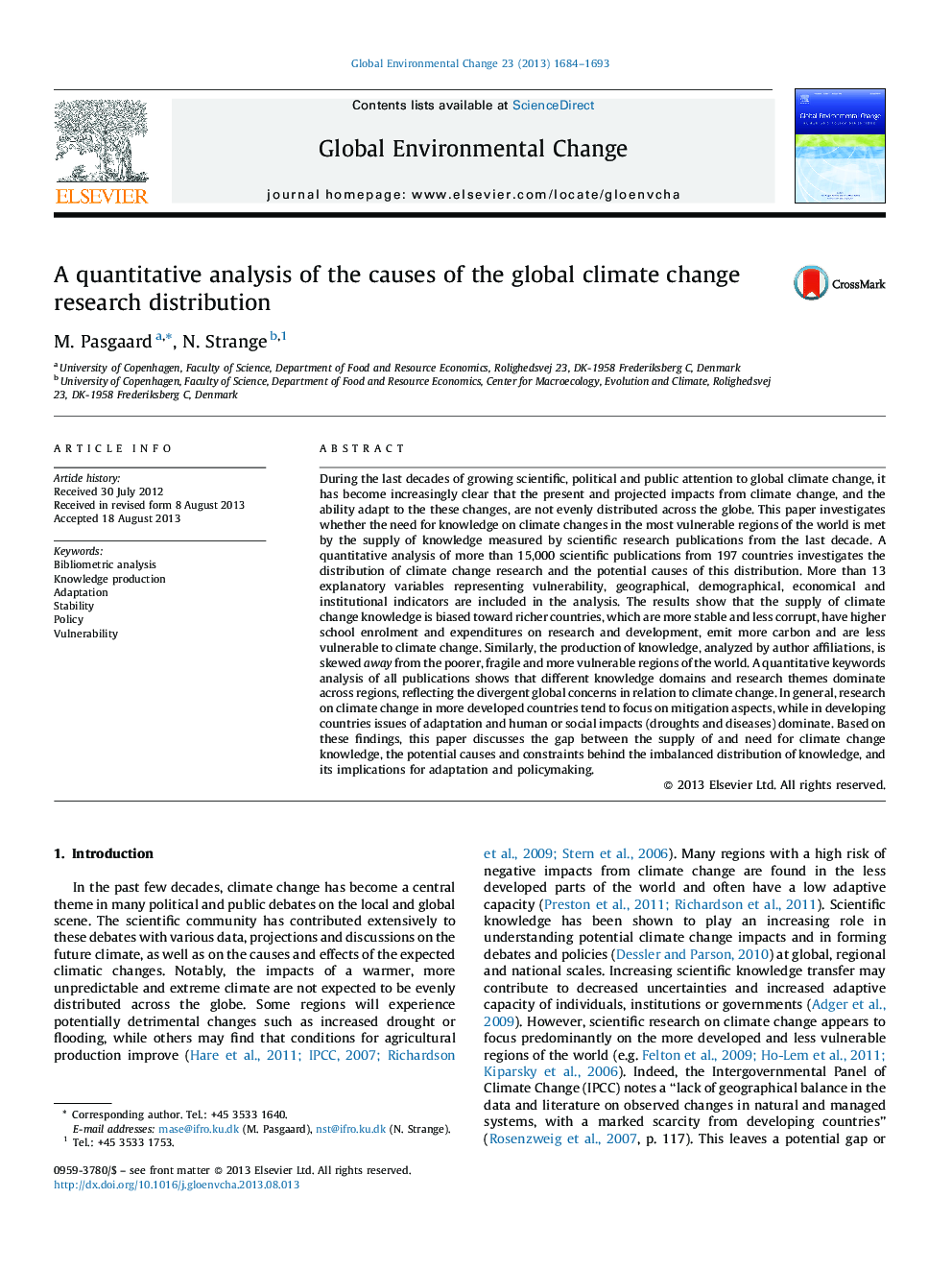| کد مقاله | کد نشریه | سال انتشار | مقاله انگلیسی | نسخه تمام متن |
|---|---|---|---|---|
| 10505041 | 946848 | 2013 | 10 صفحه PDF | دانلود رایگان |
عنوان انگلیسی مقاله ISI
A quantitative analysis of the causes of the global climate change research distribution
ترجمه فارسی عنوان
تجزیه و تحلیل کمی از علل توزیع تحقیق تغییرات اقلیمی جهانی
دانلود مقاله + سفارش ترجمه
دانلود مقاله ISI انگلیسی
رایگان برای ایرانیان
کلمات کلیدی
تجزیه و تحلیل کتابشناختی، تولید دانش، انطباق، ثبات، سیاست، آسیب پذیری،
ترجمه چکیده
در دهه های اخیر توجه علمی، سیاسی و عمومی به تغییرات اقلیمی جهانی، به طور فزاینده ای مشخص شده است که تاثیرات کنونی و پیش بینی شده از تغییرات آب و هوایی و توانایی سازگاری با این تغییرات، در سراسر جهان به طور مساوی توزیع نشده است. این مقاله بررسی می کند که آیا نیاز به دانش در مورد تغییرات اقلیمی در مناطق آسیب پذیر ترین جهان از طریق تامین دانش توسط انتشارات تحقیقاتی علمی از دهه گذشته حاصل شده است. تجزیه و تحلیل کمی از بیش از 15،000 نشریه علمی از 197 کشور، توزیع تحلیلی تغییرات اقلیمی و علل بالقوه این توزیع را بررسی می کند. بیش از 13 متغیر توضیحی که نشان دهنده آسیب پذیری، شاخص های جغرافیایی، جمعیت شناختی، اقتصادی و نهادی در تجزیه و تحلیل هستند. نتایج نشان می دهد که عرضه دانش تغییرات اقلیمی نسبت به کشورهای ثروتمند تر است که پایدارتر و فاقد فساد هستند، ثبت نام دانشگاه ها و هزینه های تحقیق و توسعه، کربن بیشتر و آسیب پذیری بیشتر در برابر تغییرات آب و هوایی است. به طور مشابه، تولید دانش، که توسط وابستگان نویسنده تحلیل می شود، از مناطق فقیر، شکننده و آسیب پذیر جهان دورتر است. تجزیه و تحلیل کلمات کلیدی کمی از تمام نشریات نشان می دهد که دامنه های مختلف دانش و موضوعات تحقیقاتی در سراسر مناطق تحت تأثیر قرار می گیرند، که منعکس کننده نگرانی های واگرا جهانی در رابطه با تغییرات آب و هوایی می باشد. به طور کلی، تحقیقات در مورد تغییرات آب و هوایی در کشورهای توسعه یافته تمایل به تمرکز بر جنبه های کاهش، در حالی که در کشورهای در حال توسعه مسائل مربوط به انطباق و تاثیرات انسانی یا اجتماعی (خشکسالی و بیماری ها) تسلط دارند. بر اساس این یافته ها، این مقاله شکاف میان عرضه و نیاز به دانش تغییر آب وهوایی، علل و محدودیت های علمی و عدم توازن توزیع دانش و پیامدهای آن برای سازگاری و سیاست گذاری را مورد بحث قرار می دهد.
موضوعات مرتبط
علوم زیستی و بیوفناوری
علوم محیط زیست
علوم زیست محیطی (عمومی)
چکیده انگلیسی
During the last decades of growing scientific, political and public attention to global climate change, it has become increasingly clear that the present and projected impacts from climate change, and the ability adapt to the these changes, are not evenly distributed across the globe. This paper investigates whether the need for knowledge on climate changes in the most vulnerable regions of the world is met by the supply of knowledge measured by scientific research publications from the last decade. A quantitative analysis of more than 15,000 scientific publications from 197 countries investigates the distribution of climate change research and the potential causes of this distribution. More than 13 explanatory variables representing vulnerability, geographical, demographical, economical and institutional indicators are included in the analysis. The results show that the supply of climate change knowledge is biased toward richer countries, which are more stable and less corrupt, have higher school enrolment and expenditures on research and development, emit more carbon and are less vulnerable to climate change. Similarly, the production of knowledge, analyzed by author affiliations, is skewed away from the poorer, fragile and more vulnerable regions of the world. A quantitative keywords analysis of all publications shows that different knowledge domains and research themes dominate across regions, reflecting the divergent global concerns in relation to climate change. In general, research on climate change in more developed countries tend to focus on mitigation aspects, while in developing countries issues of adaptation and human or social impacts (droughts and diseases) dominate. Based on these findings, this paper discusses the gap between the supply of and need for climate change knowledge, the potential causes and constraints behind the imbalanced distribution of knowledge, and its implications for adaptation and policymaking.
ناشر
Database: Elsevier - ScienceDirect (ساینس دایرکت)
Journal: Global Environmental Change - Volume 23, Issue 6, December 2013, Pages 1684-1693
Journal: Global Environmental Change - Volume 23, Issue 6, December 2013, Pages 1684-1693
نویسندگان
M. Pasgaard, N. Strange,
